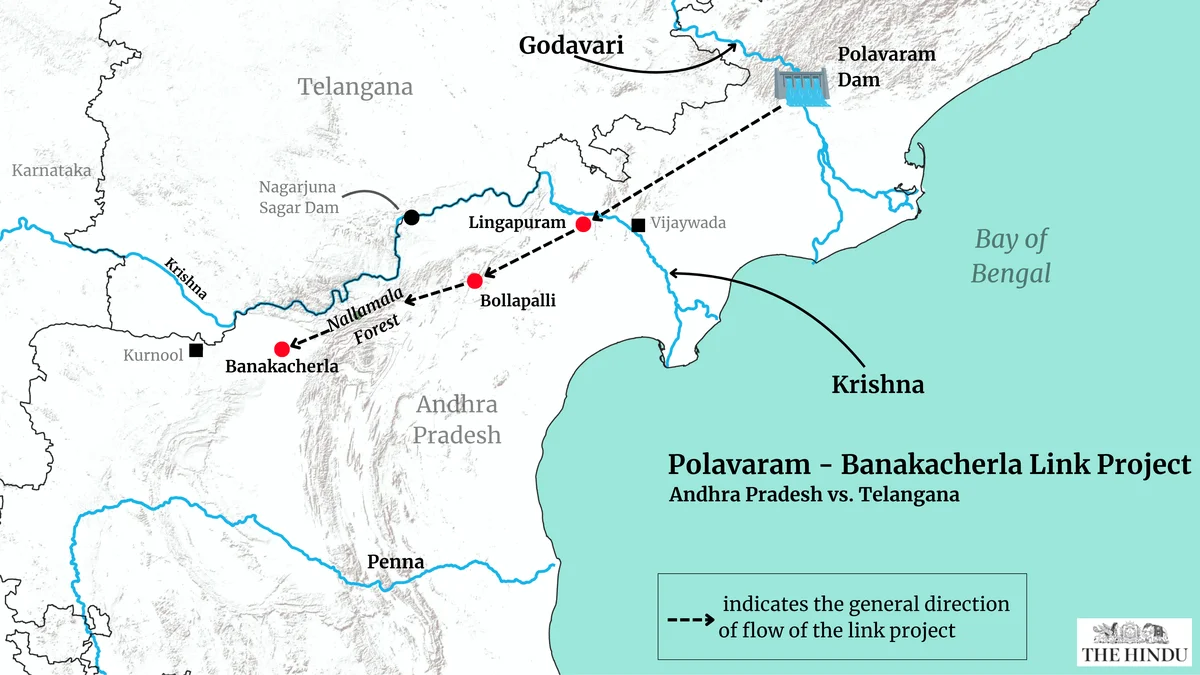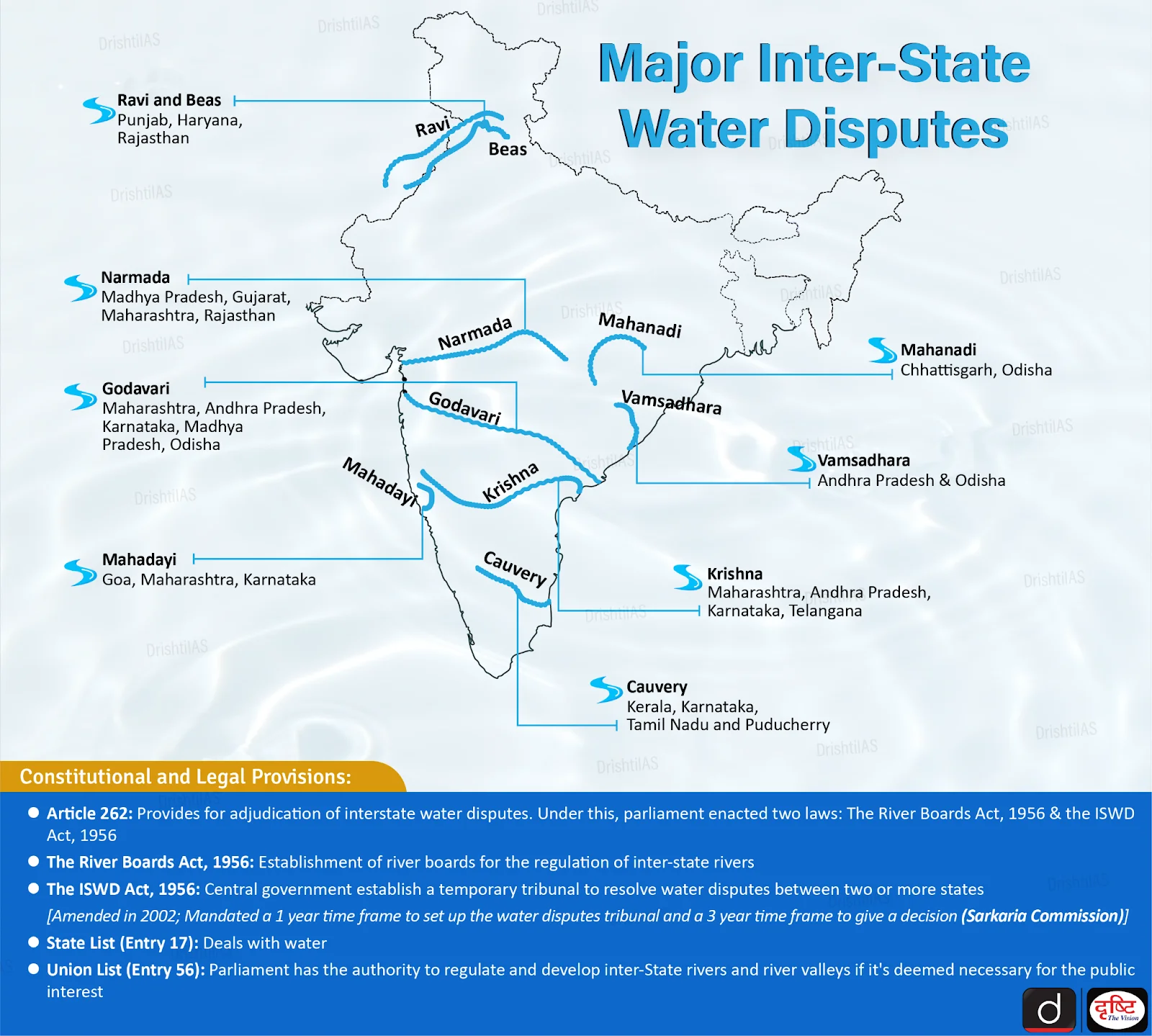Polavaram- Banakacherla Project Dispute | 02 Aug 2025
For Prelims: Krishna-Godavari water-sharing issues, Inter-State River Water Disputes, Sarkaria Commission,
For Mains: Inter State Relations, Inter-State River Water Disputes, issues related to Sharing of water Resources.
Why in News?
The Central Government has decided to constitute a high-level committee to resolve the conflict between Andhra Pradesh (AP) and Telangana over the proposed Polavaram–Banakacherla Link Project (PBLP) and other Krishna-Godavari water-sharing issues.
What is Polavaram-Banakacherla Link Project?
Polavaram-Banakacherla Link Project:
- Objective: The project aims to address water scarcity in the drought-prone Rayalaseema region by diverting 200 TMC of surplus Godavari floodwaters to the Krishna and Penna river basins.
- Water Transfer Mechanism: Water will be drawn from the Polavaram Dam, pass through the Prakasam Barrage, lifted to the Bollapalli reservoir, and tunneled under the Nallamala forest to the Banakacherla reservoir in Rayalaseema.
- Significance: The PBLP will enhance irrigation, ensure drinking water supply, and promote agricultural sustainability, improving water security and livelihoods in southern Andhra Pradesh.
Key Challenges Related to the Project
- Alleged Violation of 2014 Act: Telangana claims Andhra Pradesh violated the Andhra Pradesh Reorganisation Act, 2014, which mandates prior approval from the Apex Council, Krishna River Management Board (KRMB), and Central Water Commission (CWC) for any new inter-state river projects.
- Disputed Surplus Water Claims: Telangana disputes Andhra Pradesh’s claim of 200 TMC “surplus” Godavari floodwaters, stating that the allocation has not been adjudicated or approved by any competent authority or tribunal.
- Environmental Concerns & Pending Clearances: While the Polavaram Project received an Environmental Clearance in 2005, the Expert Appraisal Committee (EAC) noted the need for fresh environmental scrutiny and Central Water Commission (CWC) consultation due to submergence disputes with Odisha and Chhattisgarh.
- Unauthorised Inter-Basin Diversion: Telangana objects to the diversion of Godavari waters into the Krishna basin without mutual consent, warning it could reduce water availability for its projects.
- Breach of Cooperative Federalism: Telangana views Andhra Pradesh’s unilateral actions as a breach of cooperative federalism, bypassing essential consensus mechanisms for managing shared river resources.
What is the Mechanism for Inter-State River Water Disputes Resolution in India?
- Constitutional Provisions:
- Article 262 empowers Parliament to enact laws for the adjudication of disputes related to the use, distribution, or control of inter-state river waters.
- Article 262(1): Allows Parliament to provide a legal mechanism for such adjudication.
- Article 262(2): Permits Parliament to bar the jurisdiction of the Supreme Court and other courts over these disputes.
- Entry 17, State List (List II): Grants states control over water-related subjects like irrigation, canals, drainage, water supply, and hydropower.
- Entry 56, Union List (List I): Empowers the Union Government to regulate and develop inter-state rivers and river valleys in the public interest, as declared by Parliament.
- Article 262 empowers Parliament to enact laws for the adjudication of disputes related to the use, distribution, or control of inter-state river waters.
- Statutory Provisions:
- River Boards Act, 1956: Empowers the Central Government to establish River Boards, in consultation with states, for the coordinated development and management of inter-state rivers and valleys. However, no River Board has been constituted under this Act so far.
- Inter-State Water Disputes Act, 1956: Provides a legal framework for resolving disputes between states over inter-state river waters. The process includes:
- Initial negotiation by the Centre with concerned states.
- If unresolved, a Water Disputes Tribunal is constituted, whose award is final and binding.
- The tribunal's decision cannot be challenged in courts, though procedural or functional lapses may be reviewed judicially.
- The act was amended in 2002, to include the major recommendations of the Sarkaria Commission.
- The amendments mandated a one-year time frame to set up the water disputes tribunal and also a 3-year time frame to give a decision.
- Role of Supreme Court: Though Article 262(2) bars the Supreme Court and other courts’ jurisdiction over inter-state water disputes, the Supreme Court has intervened in related matters (under Article 136), such as interpreting or implementing tribunal awards.
- Eg: Mahadayi Water Dispute (2018), SC settled water allocation between Karnataka, Goa, and Maharashtra, and directed implementation of the tribunal award.
What are the Key Issues Related to Inter-State Water Disputes?
- Delayed Tribunal Awards: Tribunals often take decades to resolve disputes (e.g., Cauvery, Krishna). Also absence of time-bound mechanisms for adjudication and implementation hampers early resolution. Eg: Cauvery Tribunal (1990–2007): 17-year delay in final verdict.
- Lack of Credible and Real-Time Data: Disputes often rest on conflicting data from states, as there is no independent basin authority to validate claims. Eg: Mahanadi dispute (Odisha vs. Chhattisgarh) over unverified water flow data.
- Judicial Overlap Despite Article 262: Despite the bar on Supreme Court jurisdiction under Article 262, states often approach the Court under Articles 131/136, leading to legal ambiguity and parallel proceedings.
- Weak enforcement: Tribunal awards need central notification to become binding, but enforcement is often delayed or politically stalled.
What Measures Should be Taken to Effectively Resolve Inter-State Water Disputes?
- Time-Bound Adjudication: Amend Inter-State River Water Disputes Act, 1956 to fix timelines for adjudication of disputes and establish a permanent tribunal with technical experts.
- Reliable Data & River Basin Authority: Set up an independent river basin organization for transparent, real-time water data to prevent disputes based on conflicting claims.
- Promote Cooperative Federalism: Encourage pre-litigation inter-state negotiations and utilize platforms like the Inter-State Council to build trust and consensus.
|
Drishti Mains Question: Despite constitutional provisions and institutional mechanisms, inter-state river water disputes continue to persist in India. Discuss the limitations of the Inter-State River Water Disputes Act, 1956 and suggest reforms. |
UPSC Civil Services Examination, Previous Year Question (PYQ)
Mains:
Q. Constitutional mechanisms to resolve the inter-state water disputes have failed to address and solve the problems. Is the failure due to structural or process inadequacy or both? Discuss. (2013)


